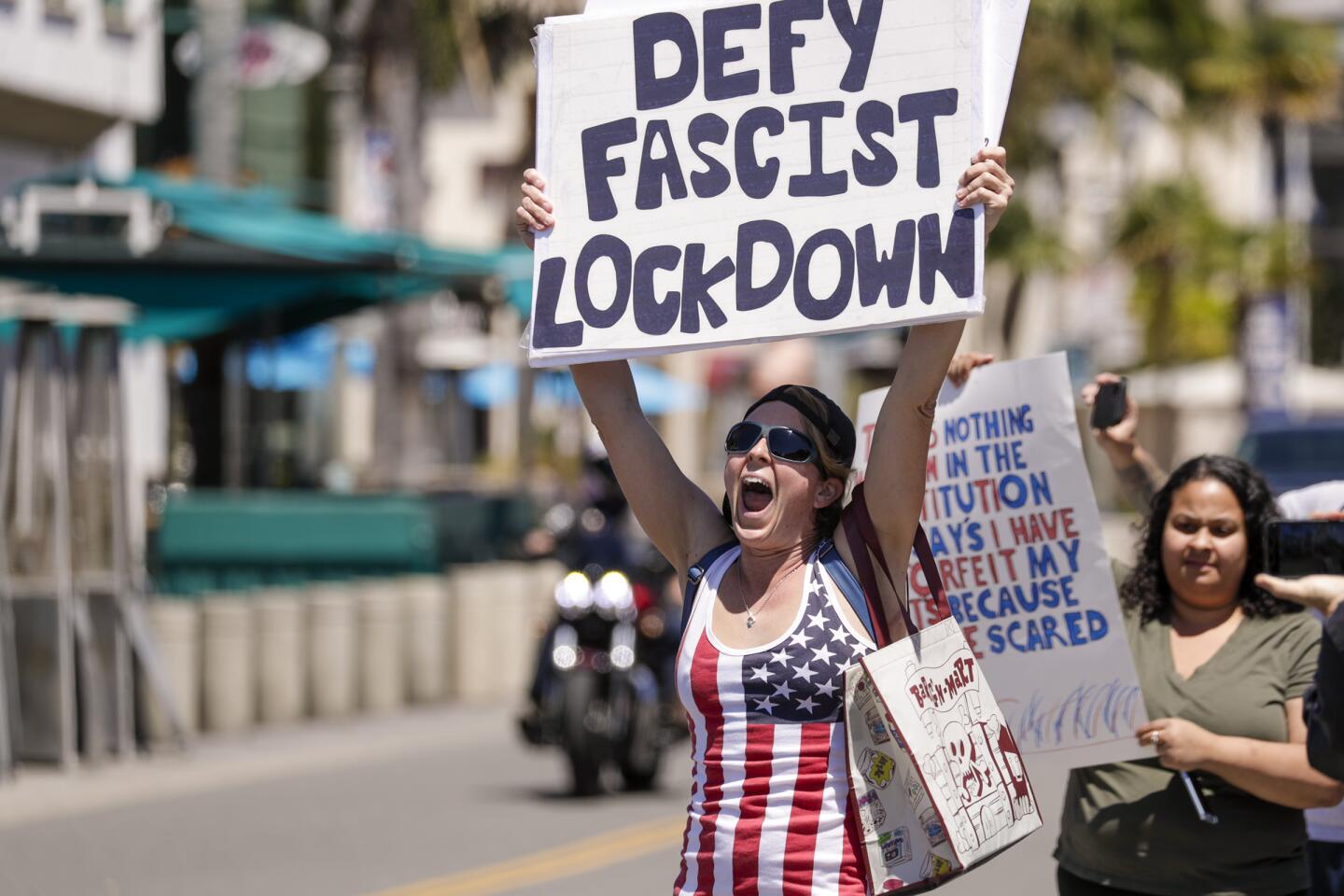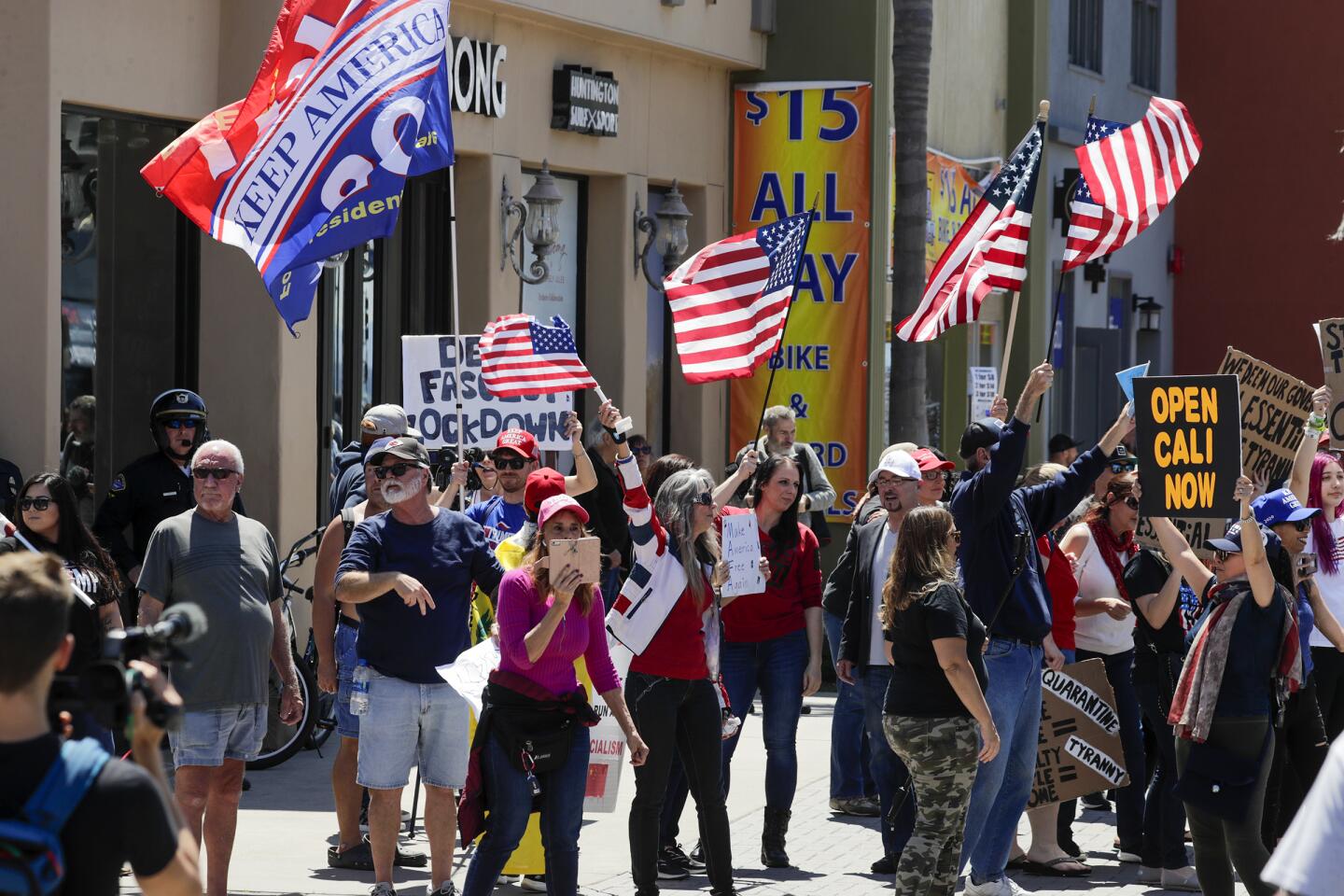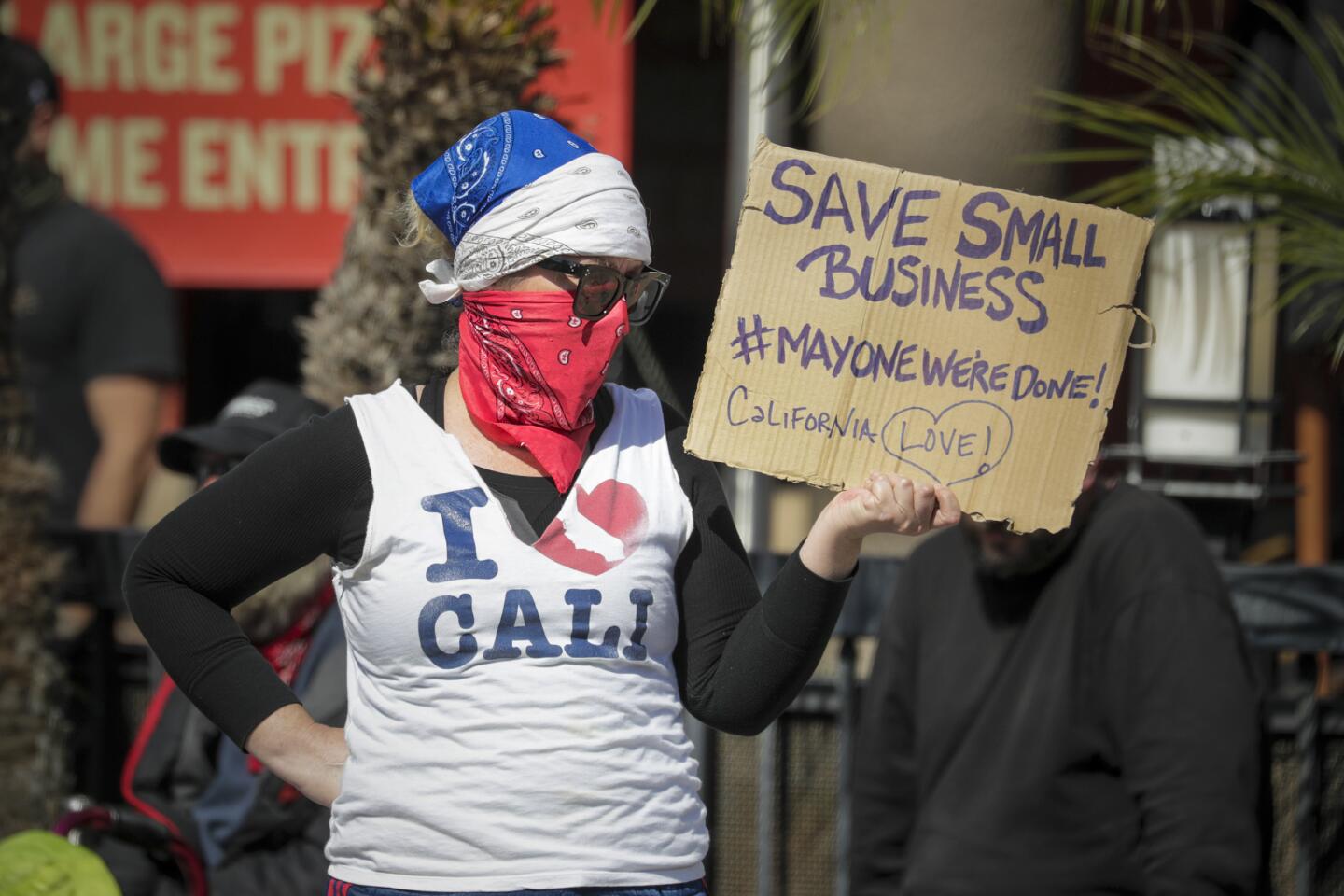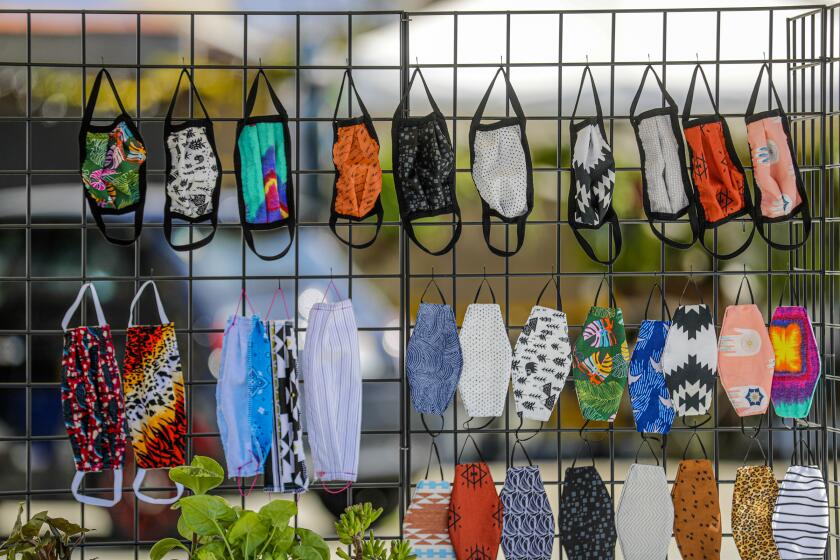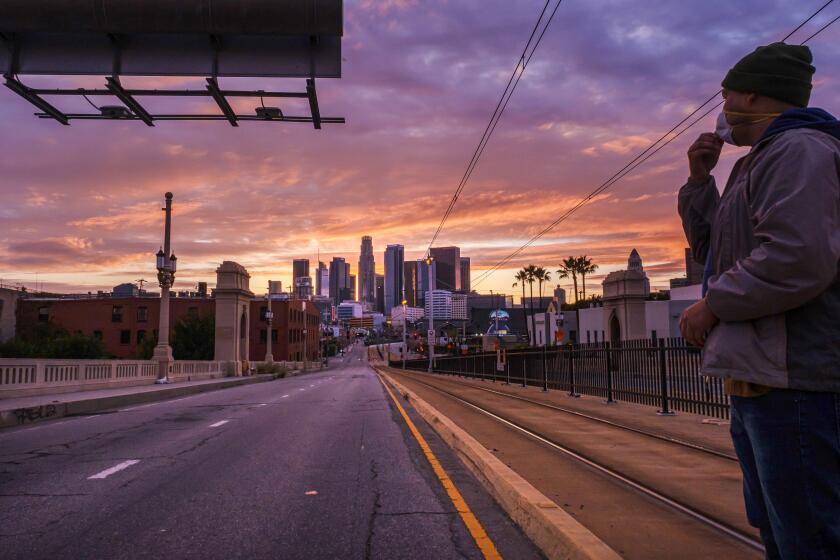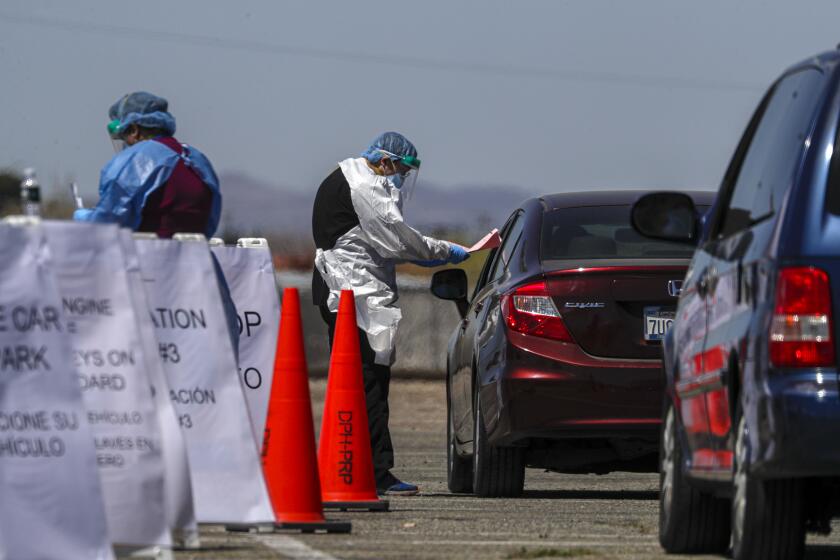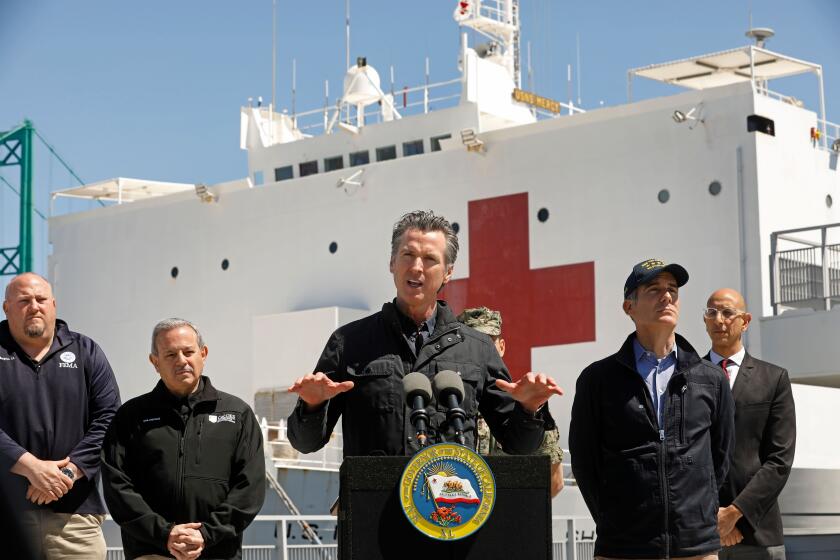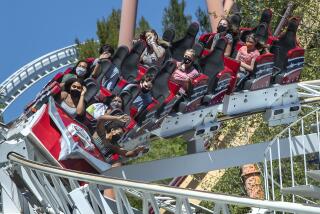Protesters demand California stay-at-home rules end. Here is how that could happen
- Share via
Over the last three days, protesters have converged in Huntington Beach, San Diego, San Clemente and Encinitas, calling for the end to California’s stay-at-home orders, which have helped slow the spread of the coronavirus.
They cite the devastating toll the shutdown has had on the economy. Some claim that coronavirus fears have been overblown and that social distancing is not needed, which goes against what public health officials and experts have said.
“I think at [this] point, people have had enough, and they want to get back to work again,” said retired Point Loma resident Darla Clark at a San Diego protest, noting that many of her friends have lost their jobs. “This is definitely where the cure is going to be worse than the disease.”
“It’s time that California opens back up,” Orange County resident Lisa Collins said at the Huntington Beach protest. “We can’t [complain] about our freedoms and liberties being taken away if we aren’t willing to do something.”
Will these protests influence lawmakers’ decisions about when to ease the rules? Here is what we know:
Coronavirus cases in California topped 30,000, with nearly 1,150 deaths, as officials said science would determine when they lifted restrictions.
Newsom urges patience
Gov. Gavin Newsom said Saturday he would not be swayed by public protests in deciding when to reopen the state.
“We are going to do the right thing, not judge by politics, not judge by protests, but by science,” Newsom said. “I just want to encourage people that when you practice your free speech — which I don’t [just] embrace, I celebrate — just do so safely. This virus knows no political ideology. It doesn’t know if you are Republican or Democrat, supporting the president, opposing the president, so practice physical distancing.”
California has seen far fewer deaths than have other hot spots, including New York, and officials believe early social distancing is one reason why.
L.A. County officials warned Friday that the region needs to increase social distancing to slow the spread of coronavirus. Stay-at-home restrictions could remain into summer.
What the governor says must happen
Earlier this month, Newsom outlined a framework for lifting some restrictions.
The administration highlighted six key indicators for altering his stay-at-home mandate and said the state must develop guidelines for when to ask Californians to stay home again if the governor modified the order and the virus were to surge.
Newsom did not offer any firm timetable for when stay-at-home orders could be modified but provided some general goals that must be met to move forward.
Experts have said that lifting social distancing rules will be a long and deliberate process, with some businesses coming back before others. For example, restaurants might be able to reopen with strict social distancing, but big events would be harder to restart anytime soon.
Here are the six factors outlined by Newsom:
We must be able to monitor and protect communities through testing, tracing of contacts, and isolating and supporting those who are positive or exposed to the virus.
— How prepared is our state to test everyone who is symptomatic?
— Do we have the ability to identify contacts of those who are positive to reduce further transmission?
We need to have the ability to prevent infection in people who are at higher risk.
— Are older Californians and the medically vulnerable living in their own homes supported so they can continue appropriate physical distancing?
— Have we developed a plan to quickly identify and contain outbreaks in facilities housing older Californians; those living with disabilities; those currently incarcerated; and those with co-morbidities, or multiple, chronic conditions?
Hospital and health systems must be able to handle surges of COVID-19 patients.
— Do we have adequate bed capacity, staff and supplies such as ventilators and masks?
— Can our healthcare system adequately address COVID-19 and other critical healthcare needs?
We must be able to develop therapeutics to meet demand.
— Have we built a coalition of private, public and academic partners to accelerate the development of therapeutics?
— Have we identified potential therapeutics that have shown promise?
Businesses, schools and child-care facilities need to be able to support physical distancing.
— Have we worked with businesses to support physical distancing practices and introduced guidelines to provide health checks when employees or the general public enter the premises?
— Do we have supplies and equipment to keep the workforce and customers safe?
We have to be able to determine when to re-institute certain measures, such as stay-at-home orders, if necessary.
— Are we tracking the right data to provide us an early warning system?
— Do we have the ability to quickly communicate the need to reinstate these measures?
Most L.A. County residents support a stay-at-home order to slow the coronavirus, despite nearly half losing a job or work hours over it, a poll found.
Polls show support for restrictions
Ninety-five percent of respondents say they support Los Angeles elected officials’ decision to implement a stay-at-home order for all but essential personnel, a Loyola Marymount University poll released last week found.
A Quinnipiac University poll released last week also showed wide support for stay-at-home orders on a national level. “While most states have issued their own stay-at-home orders, 81% of voters say they would support a stay-at-home order on a national level,” the pollsters said.
A Politico/Morning Consult poll found that the vast majority of Americans would prefer to keep stay-at-home rules if the alternative meant more spread of the coronavirus.
Models show California is at or near the peak of new coronavirus cases, as long as restrictions remain in effect. The question: How fast will the numbers start dropping?
Experts say social distancing is working
California’s relatively quick action to close businesses and order residents to stay home has tamped down the coronavirus outbreak and left many hospitals largely empty, waiting for a surge that has yet to come.
The initial success of the unprecedented shutdown of schools, businesses and other institutions has pleased experts and public health officials, prompting calls to keep the restrictions in place at least into May to help cement the progress.
Social distancing will be a critical factor. Lifting restrictions too early would likely lead to dangerous new jumps in cases.
During the 1918 flu pandemic, more than 20 U.S. cities that relaxed physical distancing orders too quickly — even as the flu virus was still circulating — soon saw a new rise in cases. There will continue to be a threat of the coronavirus being reintroduced in areas where the outbreak has eased.
Times staff writers Campa and Wigglesworth wrote from Los Angeles and McGreevy from Sacramento. Figueroa writes for the San Diego Union-Tribune.
More to Read
Sign up for Essential California
The most important California stories and recommendations in your inbox every morning.
You may occasionally receive promotional content from the Los Angeles Times.
